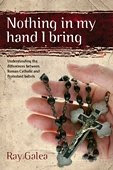How can a person be saved? Pt 2
 Carmelina raised the question of 'how can a person be saved?' on Monday, here is her conclusion:
Carmelina raised the question of 'how can a person be saved?' on Monday, here is her conclusion:Earlier this week, we saw that by faith we’re united to Christ and when we’re united to Christ, we get all the benefits of His death on the cross. This is how a person is saved from God’s judgment and guaranteed a place in heaven. And we also saw that the Bible teaches that the Holy Spirit is the person God uses to unite us to Jesus. The Holy Spirit gives us faith in Jesus, is poured out on us when we trust in Jesus and when this happens He unites us to Jesus and gives us all of Jesus’ benefits. This is the Bible’s answer to ‘how a person can be saved?’ or 'how can a person receive the benefits Jesus achieved on the cross?’
Here are just a few of the implications of the Bible’s teaching on this question:
1. The Holy Spirit brings the benefits of Jesus to us directly. This means you and I can have a personal relationship with Jesus – we don’t need a pope, a church or a priest to stand between us and Jesus and give us His benefits. Jesus can give us His benefits directly by His Spirit;
2. Our salvation is a free gift from God. From start to finish, it’s all God’s work by His Spirit. He gives us faith in Jesus. He unites us to Jesus. He gives us forgiveness and eternal life. Unlike the teachings of Roman Catholicism, we don’t need to co-operate with God and partly save ourselves. We can’t earn our salvation. We can’t boast about salvation. All we can do is gratefully receive it. Salvation is by God’s grace alone; and
3. God’s work of uniting us to Jesus through His Holy spirit means that we can have assurance of our salvation. As a Roman Catholic, you can’t be sure you’re going to heaven. Because you can never know whether you’ve done enough to receive enough of Jesus’ grace/benefits. Have you gone to mass enough, have you been to confession enough, have you done enough good works? That’s why the Roman Catholic church has masses with prayers for the dead.
I remember going to the baptism of my cousin’s son and sitting next to the priest at lunch. I was stunned to find out that he had no assurance of his salvation. He said there’s no way of knowing whether God will allow you into heaven. I said to him “Are you relying on Jesus?” He said “Yes.” So I said “doesn’t it say in 1 John in the Bible that people who rely on Jesus can know they have eternal life?’ He said “Well, you say that because you’re a Protestant.” I don’t think it’s because I’m a Protestant. I think it’s because that’s what God tells me in the Bible. After all, there are so many passages that talk about the hope and joy we can have, despite our present sufferings, because of what awaits us in heaven (1 Peter 1:3-9). How can we have hope and joy in heaven, if we can never be sure we’ll make it there?
Have you thought of any other implications?
Here are some suggested discussion questions:
1. If what the Roman Catholic Church teaches on how to be saved is wrong, what implications flow from this?
2. Do you think the differences between what the Roman Catholic Church teaches and what the Bible teaches on salvation (as I’ve outlined it) are serious enough to warrant leaving the Roman Catholic Church? Why or why not?
3. If salvation is a gift from God, what place is there for good works? (a teaser to get you thinking about the topic for next week’s post).
4. Spend some time praying for a Roman Catholic friend/family member asking God to help you to start a discussion with them about the Bible and for opportunities (and courage) to share the gospel of grace with them.
